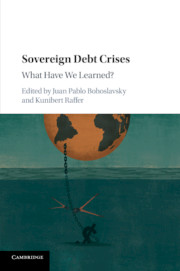Book contents
- Sovereign Debt Crises
- Sovereign Debt Crises
- Copyright page
- Dedication
- Contents
- Contributors
- 1 Introduction
- 2 Managing Public Debt Crisis in Argentina
- 3 Why Developing Countries Should Not Incur Foreign Debt
- 4 Ecuador’s 2008–2009 Debt Restructuring
- 5 Greece: An EU-Inflicted Catastrophe*
- 6 Grenada: A Small Island Developing State Needs New Ways Out of Its Debt
- 7 Iceland: A Human Rights-Sensitive Approach to Deal with Financial Crises
- 8 Indonesia’s 1997–1998 Economic Crisis
- 9 The Irish Sovereign Debt Crisis Post-2009
- 10 Short-Term Capital Controls and Malaysia’s Fast Recovery after the East-Asian Crisis
- 11 Sovereign Debt
- 12 Portugal’s Austerity Bailout
- 13 Don’t Waste a Serious Crisis*
- 14 Lessons from South Korea
- 15 The Spanish Crisis
- 16 Conclusions
- Index
14 - Lessons from South Korea
A Developmental Mindset Makes a Difference When Governing the Financial Economy
Published online by Cambridge University Press: 16 November 2017
- Sovereign Debt Crises
- Sovereign Debt Crises
- Copyright page
- Dedication
- Contents
- Contributors
- 1 Introduction
- 2 Managing Public Debt Crisis in Argentina
- 3 Why Developing Countries Should Not Incur Foreign Debt
- 4 Ecuador’s 2008–2009 Debt Restructuring
- 5 Greece: An EU-Inflicted Catastrophe*
- 6 Grenada: A Small Island Developing State Needs New Ways Out of Its Debt
- 7 Iceland: A Human Rights-Sensitive Approach to Deal with Financial Crises
- 8 Indonesia’s 1997–1998 Economic Crisis
- 9 The Irish Sovereign Debt Crisis Post-2009
- 10 Short-Term Capital Controls and Malaysia’s Fast Recovery after the East-Asian Crisis
- 11 Sovereign Debt
- 12 Portugal’s Austerity Bailout
- 13 Don’t Waste a Serious Crisis*
- 14 Lessons from South Korea
- 15 The Spanish Crisis
- 16 Conclusions
- Index
Summary
Like countless countries grappling with the challenge of late development, South Korea has – since the 1960s – accumulated large volumes of foreign debt. And like so many others, Korea has subsequently suffered a series of debt crises, some prompting intervention by the International Monetary Fund (IMF). Yet unlike other countries, Korea has tended to recover swiftly from each crisis, most recently the 1997–98 regional turmoil and the 2008 Global Financial Crisis. Moreover, despite recurrent debt crises, Korea has managed to stay a successful course of economic development. So what might policymakers elsewhere learn from Korea’s experience of debt-based development, and from its management of recurrent debt dilemmas? In this chapter I examine the critical role played by Korean policymakers in governing the country’s debt-based development strategy from the 1960s to the 1990s, and in mitigating the worst effects of its 1997–98 and 2008 financial crises. I conclude by drawing lessons from the Korean experience for policymakers elsewhere.
- Type
- Chapter
- Information
- Sovereign Debt CrisesWhat Have We Learned?, pp. 236 - 253Publisher: Cambridge University PressPrint publication year: 2017
- 1
- Cited by



